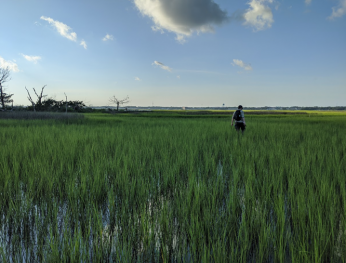Project Title: Biogeographic variation in decomposition of a foundation species
Duration: January 2024 – June 2024
Funding Source: Duke University
Lead Investigator / onsite-contact: David DeLaMater / Megan Tyrrell
Affiliation: Duke University / Waquoit Bay NERR
Email: daviddelamater@duke.edu / megan.tyrrell@mass.gov
Project Description: The purpose of this project is to investigate the relative role of plant traits versus environment in determining the rate of decomposition in smooth cordgrass (Spartina alterniflora).

Hoop Pole Marsh, Atlantic Beach NC; one of our four decomposition sites
Salt marshes are an important coastal ecosystem from which we derive many useful ecosystem services. Chief among those services is carbon storage. Smooth cordgrass (Spartina alterniflora) plays an outsized role in salt marsh ecosystems, not unlike the role played by the grasses of the prairies in the Midwest. The rate at which smooth cordgrass decomposes is a main driver of the rate at which salt marshes store carbon; the more decomposition, the less carbon storage. In our previous investigations, we found that smooth cordgrass growing at southern latitudes has much tougher tissue than the same species growing at northern latitudes. It’s well known that tougher plant tissue takes longer to decompose. At the same time, we also know that warmer environments are more conducive to faster decomposition rates than are cold environments. This leads us to ask the question: Which is more important to smooth cordgrass decomposition, their toughness or their environment? This is an increasingly relevant question as climate change will result in future northern marshes having similar temperature regimes as present southern marshes. Stated simply, will tougher grass be harder to decompose no matter the latitude, or will environment trump all other effects?
To investigate this, we have collected smooth cordgrass from multiple latitudes (which have different levels of toughness), and used it to create “litter bags”, which are a standardized way to measure decomposition rates. We will deploy these litter bags at multiple latitudes (different environments) and measure the rate of decomposition over roughly 5 months. We hypothesize that grass placed in southern latitudes will decompose more quickly than grass placed in northern latitudes, and also that within each latitude, tougher grass will decompose more slowly than less tough grass.

